 Crispin Fletcher-Louis has just begun his new blog here. I have thoroughly enjoyed Fletcher-Louis’s articles and monographs thus far and I’m excited to see the small engagements on his blog regarding temple studies, divine priesthood, divine humanity, etc. His earlier monograph entitled “Luke-Acts: Angels, Christology, and Soteriology” in the WUNT series is a very intriguing look at angelomorphic priestly Christology and participation. His following monograph entitled “All the Glory of Adam: Liturgical Anthropology in the Dead Sea Scrolls” is an in depth treatment of many of the texts regarding the divine priestly anthropology apparent in the DSS, much of which he wanted to further pursue after his work in the Lukan corpus. He includes an interesting commentary on the Songs of the Sabbath Sacrifice for those interested in these mystical priestly texts. Make sure and check out his first blog post on “The High Priesthood of All Believers.” Enjoy.
Crispin Fletcher-Louis has just begun his new blog here. I have thoroughly enjoyed Fletcher-Louis’s articles and monographs thus far and I’m excited to see the small engagements on his blog regarding temple studies, divine priesthood, divine humanity, etc. His earlier monograph entitled “Luke-Acts: Angels, Christology, and Soteriology” in the WUNT series is a very intriguing look at angelomorphic priestly Christology and participation. His following monograph entitled “All the Glory of Adam: Liturgical Anthropology in the Dead Sea Scrolls” is an in depth treatment of many of the texts regarding the divine priestly anthropology apparent in the DSS, much of which he wanted to further pursue after his work in the Lukan corpus. He includes an interesting commentary on the Songs of the Sabbath Sacrifice for those interested in these mystical priestly texts. Make sure and check out his first blog post on “The High Priesthood of All Believers.” Enjoy.
A Jewish View of Paul – A Skype Interview with Mark Nanos
I had the privilege of interviewing Dr. Mark Nanos via Skype regarding his take on the Apostle Paul as summarized in the most recent “Counterpoints” volume edited by Michael Bird entitled “Four Views on the Apostle Paul.” Nanos presents a Jewish view of Paul that seeks to deal with why Judaism has viewed him in such a negative light and how the so-called ‘New Perspective on Paul‘ does not go far enough in their re-framing of the Apostle because they are still working from within the Christianity-versus-Judaism categories. For Nanos the problematic old understanding of a Lutheran Paul as fighting against a Judaism consisting of legalistic works-righteousness has been simply exchanged for a Paul fighting against a ‘Jewish ethnocentric exclusivism and particularism (p.162).’ Although this may be a helpful observation, there were still many questions that remained regarding many of Nanos’s interpretive decisions and some important places of neglect that are addressed in this particular interview. If you have 45 minutes to spare, you may want to check it out. I apologize for the poor video quality (the bad aspect ration cutting off the top of the screen, the sound, forgetting to move the mouse cursor off the screen, etc.) it’s my first time editing on iMovie.
A special thank you to Jonathan McLeod and Alex and Katy White for their outstanding collaborative effort on our group presentation on Nanos’s view on Paul for the Pauline Theology Seminar at Criswell College Fall 2012.
The Martyrdom and Ascension of Isaiah and the Destruction of the Powers of This Cosmos
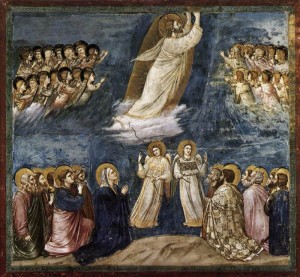 After reading the Martyrdom and Ascension of Isaiah I was left with a nagging question that I can not answer. So, I’m hoping that there is someone out there who has spent more time with apocalyptic literature or (more specifically) ascension narratives that might be able to provide an answer for me.
After reading the Martyrdom and Ascension of Isaiah I was left with a nagging question that I can not answer. So, I’m hoping that there is someone out there who has spent more time with apocalyptic literature or (more specifically) ascension narratives that might be able to provide an answer for me.
In the Ascension of Isaiah, the Most High commissions Jesus to descend through the seven heavens into the firmament, where the evil powers of the firmament rule and envy each other (7.9). As he travels through each heaven and into the firmament, Jesus’ form will transform to match the angels that exist in each level. So when Jesus arrives in the firmament, he is unrecognizable as the one who is the Lord of the seventh heaven (10.11). Once in the firmament, his furtive mission is to carry out the process of being born of a virgin (11.2–15), to act like a baby––so as not to draw attention to himself as if he is something greater (11.17)––to perform signs and wonders in Israel (11.18), to provoke the adversary and the children of Israel to kill him (11.19–21), to raise from the dead, send out the twelve apostles, to ascend back through the heavens, and to take his seat on his throne (11.21–22). At this point in the narrative, we learn that the purpose of this mission is be able to pronounce judgment on Satan and his forces in the firmament and to destroy them (7.10; 10.12).
Another key purpose of Jesus’ mission is that it marks a transitional point in time when those who have already ascended into the seventh heaven and have already received their supernal garments (e.g., Enoch) will then receive their crown and be aloud to sit on their throne (9.9–13). For those who had died but not yet ascended, they will ascend with Jesus and receive their supernal garments in the seventh heaven (9.17–18). So it appears that Jesus mission serves two purposes: (1) to judge and destroy the powers of the firmament and (2) to complete the transformation of the righteous, who are awaiting their supernal garments, their crowns, and their thrones.
That Jesus must appear in human form in order to complete the transformation of the righteous into their immortal state is clear to me: Jesus serves as the firstfruits of human apotheosis. What is less clear, though, is why Jesus had to descend into the firmament and carry out the mission in order to judge and destroy the rulers of the firmament. It is also curious to me that when Jesus does ascend, he does not pronounce judgment on the powers and he does not destroy anyone.
So here are my question: According to the Ascension of Isaiah (or other narratives which might invoke a similar theme), how and when is this judgment and destruction supposed to take place and why was it necessary for Jesus to carry out this mission in order to judge and destroy the powers of the firmament?
The Different Faces of the Apostles in the Second Century: James
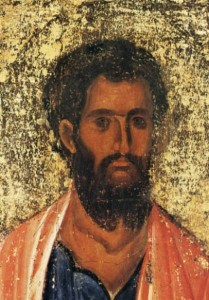 This semester I am taking a class on Christianity in the second century, where we are reading through Christian primary literature. For this class I have decided to catalog the different ways in which the apostles are used to promote a certain way of Christianity. For example, I want to see how Peter is used by the various second century writers to promote their own Christian self-identification and how this same figure is used to polemicize against other Christian groups. I am examining these texts from a historical point of view, rather than a theological perspective. In other words, I am not attempting to argue that one text is superior to another because one might hold to a more “orthodox” or “heretical” view than another. Rather, I am seeking to find the different ways in which Christianity expressed itself in the second century and, more specially, how they used apostolic figures to express these sometimes competing views. Because of this, I will speak of all these groups as Christian, and will do my best to avoid terms like “gnostic,” “heretical” and “orthodox.”
This semester I am taking a class on Christianity in the second century, where we are reading through Christian primary literature. For this class I have decided to catalog the different ways in which the apostles are used to promote a certain way of Christianity. For example, I want to see how Peter is used by the various second century writers to promote their own Christian self-identification and how this same figure is used to polemicize against other Christian groups. I am examining these texts from a historical point of view, rather than a theological perspective. In other words, I am not attempting to argue that one text is superior to another because one might hold to a more “orthodox” or “heretical” view than another. Rather, I am seeking to find the different ways in which Christianity expressed itself in the second century and, more specially, how they used apostolic figures to express these sometimes competing views. Because of this, I will speak of all these groups as Christian, and will do my best to avoid terms like “gnostic,” “heretical” and “orthodox.”
Let’s begin with James. In our earliest record of James, he is presented as one of the pillars of the Christian movement (Gal 2.9). This tradition of James as an authority is indicated again in Acts 15 and 21 and is supposed by second century writers based on the fact that they used his name to authorize their writings (see also the Epistle of Jude, where the author validates the letter by establishing a familial relationship with James [1.1]). In the NT, James is––for the most part––a consistent figure; namely Jewish. In the epistle bearing his name, James is adamant about keeping the Torah, and speaks about the Torah in terms of grandeur (“law of liberty,” 1.25; “royal law,” 2.8). The law also retains its function in the Jesus movement as a form of conviction (against favoritism, 2.9), and it does not appear that James is willing to be selective as to which portions of the law Christians must follow; rather the unity of the law is upheld in that if someone breaks one part of the law, he or she has violated the entire law. It should also be noted that James’ community gathers in a synagogue (2.2).
I am not convinced that Acts 15 speaks against the Jewishness of James or James’ Jewish vision for the church. The role of Gentiles in a Jewish community was a debated issue within the spectrum of Judaism. So it does not follow in my mind that the James of Acts is necessarily promoting a dichotomy between Christianity and Judaism. What is more important to notice about James at this point is that there is no indication that James despises the god of the Hebrew Scriptures or the Scriptures themselves.
Thus, in the NT, I believe the Jewishness of James is upheld or at least nothing definitively reveals James to be other than a promoter of some spectrum of Jewish Christianity.
In the middle of the second century, we find two apocalypses attributed to James. The First Apocalypse of James reveals a conversation between Jesus and James prior to Jesus crucifixion and another conversation between the risen Jesus and James prior to James’ martyrdom. In the Second Apocalypse of James, we find James on trial, reporting to his accusers about conversations he and Jesus had in the past, after which he is stoned.
There is a significant difference between the James of the First Apocalypse and that of the second. The former has a positive view of the god of the Hebrew Bible (HB). This god is the one who is unnamable and ineffable (1 Apoc. Jas. 24). Jesus comes from him and is his image (1 Apoc. Jas. 24, 25). In the Second Apocalypse, however, the god of the HB is viewed in a much more negative light:
“Your father [god of the HB], whom you consider rich, will grant that you inherit all that you see.…His inheritance, which he boasted about, claiming it was great, will prove to be insignificant. His gifts are not blessings and his promises are evil intrigues. You are not of <the children> of his compassion, but he does violence against you. He wants to do injustice against us. And he will have dominion for a period of time appointed for him” (2 Apoc. Jas. 52, 53).
In similar sentiment, we read:
The creator god [of the HB] cannot perceive the light of the supreme Father and he merely uses the light. “Because of this he [utters curses], and because of this he boasts, that he may not be rebuked. For this reason he is superior to those who are below, who were looked down upon, in order to be perfected in them. After he captured those who are from the Father, he seized them and shaped them to resemble himself and so they are with him” (2 Apoc. Jas. 54).
By contrast, the author of the Second Apocalypse views the supernal Father as the superior deity:
“But understand and know the Father who has compassion, who was not given an inheritance, whose inheritance is unlimited, with an unlimited number of days.” Rather, it is an eternal [day], and it is [light]” (2 Apoc. Jas. 52–53).
That the author of Second Apocalypse is polemicizing against the god of the Jews is clear. It would follow then that this author has appropriated the representative leader of the church for a more non-Jewish purpose; namely, the rejection of the Jewish god and, thus, all things promised by the this god (e.g., land, long earthly life). This is diametrically opposed to the James we find in the Epistle (who reveals no animosity against the god of the HB, seemingly view the Torah in high regard [1.25; 2.8–12], and still envisions the community meeting in a synagogue [Jas 2.2]) and is more extreme than the James we find in Acts (wherever one might place the James in Acts on the Jewish/Christian spectrum, he never rejects the god of the HB).
Aside from their disparate views on which god constitutes the true and supreme deity, these two works are homogenous on some fairly substantial points. Both works decry the flesh and look toward a time when their terrestrial bodies can be defenestrated (1 Apoc. Jas. 27; 32; 2 Apoc. Jas. 57; 63). In spite of the author of the First Apocalypse affirming and praising the Jewish god, he nevertheless joins the author of Second Apocalypse in condemning the terrestrial as perishable, impure, and ignorant and anticipating the imperishable supernal life (1 Apoc. Jas. 28; 2 Apoc. Jas. 46; 60).
Thus, in the two apocalypses of James we find both continuity and discontinuity. The two James’ agree that the flesh is to be dispensed and they both condemn the terrestrial realm because of its inherent failures and both look forward to an eternal life of supernal bliss. However, James becomes schizophrenic when we look at his view of the Jewish god; the author of the First Apocalypse favors the Jewish god and never mentions the possible existence of another greater deity, while the author of the Second Apocalypse rescinds the authority of the Jewish god––claiming he only promised things that were perishable––and exalts the supernal god––who promises immortality. In other words, in the 1 Apocalypse of James we find a Jewish James, while in the 2 Apocalypse of James we find a non-Jewish James, who actually rejects the Jewish god. They perceive of their future in similar terms but perceive of their pasts in very oppositional ways.
Ancient Heroes as Paradigms of Vicarious Sacrifices for the Maccabean Martyrs?
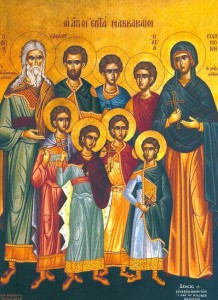 Fourth Maccabees is a philosophical treatise intended to show how reason can overcome pain and adversity (chs. 1–3). By enduring through adversities––as in the case of the martyrs in 4 Maccabees––God rewards such an individual with apotheosis. It is in this light that the author of 4 Maccabees tells the story of the martyrdom of Eleazar, the priest, and the mother and her seven sons. Throughout the tortures and coaxing of Antiochus and the torturers, none of the martyrs succumbed to the pain and the desire for “instant deliverance” (15.3). In so doing, they rejoiced in their postmortem hope of immortality (see 7.18–19; 9.8–9, 21–22; 10.15; 14.5; 15.3 16.13, 25; 17.5, 11–12; 18.3).
Fourth Maccabees is a philosophical treatise intended to show how reason can overcome pain and adversity (chs. 1–3). By enduring through adversities––as in the case of the martyrs in 4 Maccabees––God rewards such an individual with apotheosis. It is in this light that the author of 4 Maccabees tells the story of the martyrdom of Eleazar, the priest, and the mother and her seven sons. Throughout the tortures and coaxing of Antiochus and the torturers, none of the martyrs succumbed to the pain and the desire for “instant deliverance” (15.3). In so doing, they rejoiced in their postmortem hope of immortality (see 7.18–19; 9.8–9, 21–22; 10.15; 14.5; 15.3 16.13, 25; 17.5, 11–12; 18.3).
But the deaths of the martyrs represent more than their own immortality, their deaths were also viewed as vicarious sacrifices, providing forgiveness of sins for the nation and purifying the land from the tyrant (i.e., Antiochus IV; 6.27–29; 17.20–22). Thus, the martyrs deaths were efficacious for both their own immortality and the deliverance of the nation from sin and impurity.
The martyrs are repeatedly compared to and encouraged to imitate past heroes who endured bravely through trials. The four most prevalent heroes are Abraham and Isaac (7.13–14; 13.8–12; 16.18–20; 18.11; cf. Gen 22 [Akedah]), Daniel (13.9; 16.3, 21; 18.12–13; cf. Dan 6), and the three youth in the furnace (13.9; 16.3, 21; 18.12–13; cf. Dan 3). These past heroes are consistently evoked as those who courageously and willingly offered their lives but they are never evoked as paradigms as those who died as an expiation for sins or the deliverance of a nation from oppressive powers.
While some argue that expiatory value is attached to the Akedah in 4 Maccabees, I am not convinced. For one, the two passages in 4 Maccabees where the expiatory nature of the martyrs’ sacrifices is evinced (6.27–29; 17.20–22) no allusion to the Akedah appears. The allusions to these past heroes are always evoked in context courage, willingness, and immortality. The author of 4 Maccabees has, therefore, given no indication that he is reading these paradigmatic stories in any other way.
I am also not convinced by the arguments that state that the expiatory nature of the Akedah is implicit in that it is ambiguous whether Isaac lived or was sacrificed (cf. 13.8–12; 18.11) and (thus) by comparing Isaac to the martyrs’, the conclusion that Isaac’s death was vicarious would naturally follow. Concerning the latter, this argument conflicts with the author’s habitual reflections of the martyrs’ being encouraged to behave like their ancestral heroes. In other words, the ancestral heroes are always presented as paradigms for the martyrs’, not vice versa. Concerning the former argument, it would appear that the author of 4 Maccabees is dealing with the obvious tension between the martyrs and their heroes, in that while the martyrs’ die, their heroes, whom they emulate, are delivered prior to their deaths. Because of this, the author of 4 Maccabees emphasizes the areas in which they are similar (e.g., bravery, willingness, rational) but stops short of creating a new Akedah tradition in which Isaac is actually sacrificed but also does not say that the sacrifice was stopped. Thus, it is difficult to even say that the author implies that Isaac died on the altar. The most that can be said is that the author of 4 Maccabees has refrained from explicitly stating how the offering of Isaac ended and, thus, has created an ambiguity, which alleviates the inherent tension in the comparisons that are made between the Akedah and the Maccabean martyrs.
Although the Akedah fails to be persuasive, both the Old Greek and the Theodotion versions of the three youth contain additional material that relates to our conversation about vicarious sacrifices (LXX Dan 3.22–96). Of particular interest is the first prayer made by Azarias, one of the three youth.
While this addition is primarily about God’s deliverance (cf. LXX Dan 3.95–96), Azarias’ speech reveals that the imminent (although never completed) death of the three youth would have been viewed as a meritorious sacrifice, efficacious for the nation. Azarias begins by praising God, then confesses the sins of the nation, and acknowledges the justness of God’s judgment. He then pleads to God not to forget his covenant, which he made with Abraham, Isaac, and Israel (vv. 34–35). After they acknowledge that there is no burnt offerings or sacrifices in the land, they ask God:
But rather with a broken life and a humbled spirit may we be accepted, as though it were with whole burnt offering or rams and bulls and with tens of thousands of fat lambs; thus let our sacrifice come before you today… (vv. 39–40)
Following this, Azarias asks God to deliver them (v. 43). This is an odd request when he just finished asking God to accept their sacrifice. Thus, perhaps Azarias is requesting a postmortem deliverance. Nevertheless, Azarais views their deaths as something that should deserve merit. In this case, the merit is expiation of national sins; they would serve as vicarious sacrifices for the sins of the nation. With the nation being purified from their sins via the sacrifice of the three youth, their hope seems to be that God will deliver the nation from exile and oppression (vv. 40–45). (There does not appear to be any appeal to a hope of future immortality.)
Assuming that this tradition preserved in these Greek translations predates 4 Maccabees (first half of the first c.–early second c.)––which I think is a safe assumption––it is interesting that the author of 4 Maccabees does not appeal to this tradition when he is ascribing expiatory value to the martyrs deaths (cf. 6.27–29; 17.20–22). Perhaps this silence suggests that the author was unaware of this tradition. Or perhaps the author did not like these additions to the Hebrew/Aramaic texts and chose to ignore them altogether. Nevertheless, I find it fascinating that there is yet another martyrology that ascribes nationalistic merit to the (would-be) deaths of the martyrs’. Perhaps, in our examinations of 4 Maccabees, if we are looking for ancient heroes whose deaths exhibited merit, we should look to the three youth. In the end, though, I think this would be about as tenuous as looking for expiatory value in the Akedah as it is presented in 4 Maccabees; the author simply does not make this connection.
Jesus Tells a Lie and Breaks the Sabbath: Festival Attendance and Sabbath Controversy
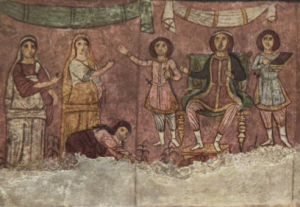
I derive the title of this post from John 7, where Jesus first tells a lie (7.1–10) and later defends his right to heal on the Sabbath (7.20–24; cf. 5.1–15). I would imagine, that for many readers of this post, the first of these transgressions is much more shocking than the latter. Interestingly, though, while Jesus breaks two commandments of the Decalogue he only defends himself against Sabbath breaking. In fact, the evangelist is not at all concerned that Jesus lies.
In this post, I want to briefly examine both transgressions and then offer a hypothetical retelling of the Sabbath controversy, where we replace Sabbath breaking with lying. This will be an attempt to explicate the severity of Jesus’ actions to those who are typically not troubled by Jesus’ actions on the Sabbath.
{Update (7/7/13): When I first wrote this post it seemed to me evident that Jesus was indeed lying. I therefore did not include a defense of this conclusion but simply stated it as fact. I have received a couple of responses challenging my statement that Jesus was lying and, while I have responded to them below, I feel that I ought to provide a formal defense within the post of why I believe Jesus is lying in John 7.
It seems to me that Jesus’ journey to Jerusalem to celebrate Succoth anon after telling his brothers that he is not going to Jerusalem leaves us with two options: Jesus changed his mind or he lied to his brothers. If we entertain the former, we need to find something in the text that reveals (whether explicitly or implicitly) that Jesus changed his mind. Thus, we need to know why Jesus decided not to go. In v. 6 Jesus tells his brothers that the reason does not want to attend Succoth is because his “time has not yet come,” which means it is not time for Jesus to die. Thus, in light of his opposition that is waiting to kill him at any opportunity (v. 1), Jesus’ reason for not wanting to attend Succoth is more than understandable. It is odd, however, that Jesus does attend the festival even though his hour had not yet come (see 8.20) and indeed will not come until the end of his public career (17.1). It does not seem, then, that Jesus changed his mind, for the very reason why he told his brothers he was not attending had not yet occurred.
In order to examine the second option––i.e., Jesus lied––we need to find a motivation to for Jesus to lie. The narrative reveals that there was an opposition to Jesus waiting in Jerusalem in order to kill him (v. 1), thus Jesus can not enter into Jerusalem conspicuously. Although his brothers are probably not intending to enter Jerusalem behind a marching band announcing their arrival, they are also not concerned about stealth. Jesus, on the other hand, wants to remain unseen until his speech. Thus, it is quite plausible that Jesus lied to his brothers that he was not going to attend Succoth so that he could surreptitiously enter Jerusalem on his own (v. 10) and remain their under the protection of his supposed absence (a pretense his brothers would have unknowingly spread).
In the end, the argument that Jesus changed his mind is weakened by the fact that the reason Jesus gave for not attending Succoth is not fulfilled until ch. 17. In other words, there appears to be no explicit or implicit reason in the text for Jesus to have changed his mind. On the other hand, the argument that Jesus lies coincides well with Jesus’ knowledge that his opponents want to kill him, which provides a clear motivation as to why Jesus would have lied to his brothers.}
* * *
Growing up, lying was always considered one of those absolute sins; that is, there was never a time when lying was justified. It’s a sin. Period. You don’t do it. It was also common to play the “what if” game, where we would place ourselves in difficult scenarios, which would engender a discussion about whether it was appropriate to lie or whether the truth was the appropriate response. As far as I remember, 100% of the time, no matter what situation in which we found ourselves, it was always wrong to lie. We justified this by saying that when we tell the truth, we leave matters in the hands of God.
While I am no longer an “absolutist” about the sinfulness of lying, it was still a bit shocking when I came across a lie told by Jesus. In John 7.8, Jesus tells his brothers, “I am not going to this festival, for my time has not yet fully come.” Once his brothers go off to the festival, however, we are told that “Jesus himself also went up [to the festival]” (v. 10).
Jesus certainly has his reasons for lying to his brothers; namely, that he desires to attend the festival secretly, for his time (i.e., arrest/death) has not yet come (v. 6). Regardless of the reasons, though, Jesus is portrayed as a liar. What’s more, the evangelist does not seem to be too concerned about Jesus’ lie. Rather, the evangelist is much more concerned with defending Jesus’ other sin: healing on the Sabbath (7.20–24; cf. 5.1-15; 9.1–14).
Jesus’ healing on the Sabbath was first taken up by the evangelist in ch. 5. Jesus defended his actions by stating that he will work on the Sabbath because the Father works continuously (v. 17). In ch. 7, though, Jesus takes a different approach. He defends himself by pointing out the already established rule that when the eighth day of an infants life falls on the Sabbath it is permitted to break the Sabbath to perform circumcision. Basically, circumcision was determined by the Jewish leaders to be weightier than the Sabbath. So when these two regulations came in conflict with each other, the weightier law (in this case, circumcision) was to be observed. Jesus’ conclusion is that healing someone on the Sabbath is not a sin because deliverance from oppression is a weightier command than keeping the Sabbath.
If you are not a Jew, the fact that Jesus would break Sabbath regulations to heal someone probably does not cause you any concern. However, keeping the Sabbath has always been a hallmark of Judaism. As such, Jesus actions on the Sabbath would come across as shocking and incredible for many Jews. This was certainly true for Jesus opponents in the Gospel accounts.
So why are non-Jews less troubled by Jesus actions on the Sabbath? I can only imagine it is because there is no emotional tie to the Sabbath. Gentiles might be aware of the importance of the Sabbath for Jews but this awareness is nothing more than intellectual knowledge. The Sabbath does not significantly impact the lives of gentiles.
Lying, on the other hand, has a more significant impact. For many Christians (and Jews?) lying is a sin that is never justified. If this is the case, I would argue that if these Christians want to get a better understanding of how unimaginable Jesus’ Sabbath actions would have been to those around him, perhaps it would be worthwhile to replace “Sabbath” with “lying.” As mentioned at the beginning of the post, this is a hypothetical scenario. Nevertheless, it bears some veracity because we have already seen that Jesus does tell a lie.
If we insert “lying” in place of “Sabbath,” then in John 5 and 9 Jesus delivers a man from oppression by lying. (Perhaps a fitting scenario would be that the man is being oppressed and Jesus lies about his whereabouts in order to deliver him from his oppressors. There are certainly other occasions in the Scriptures where someone lies to deliver someone from oppression and in return are blessed by God because they are doing his will [Exod 1.15–21; Josh 2]. More recently, those who lied to protect the Jews from the Nazis would be an appropriate illustration.) To put this in an accusatory form, Jesus is a liar. If this strikes you as blasphemous, then you get the point. It would be similar to the accusatory statement, Jesus breaks the Sabbath. One might respond that, “God would never command someone to lie; thus, clearly a man who lies can not be from God.” Now your starting to react like Jesus’ opponents (9.16). For Jesus, though, his actions are not his own, but those of the Father (4.34; 5.17, 19–22, 30, 36; 8.28; 10.25, 37; 14.10; 17.4, 14). Thus, Jesus is vindicated when he breaks the Sabbath and when he lies, for God has commanded him to do both.
Jesus Kept Kosher
What follows is a review of chapter 3 in Daniel Boyarin’s new book The Jewish Gospels. I intend to review all the chapters but this was the first chapter review I finished. In this chapter Boyarin’s thesis is simple: Despite centuries of interpretation otherwise Jesus did not, in any way, abandon the Torah and not only that but, he is representative of an older more conservative Judaism not a heretical liberal spin-off. The old misinterpretation, he claims, results from the misreading the controversy story found in Mark 7.
¶ Now when the Pharisees and some of the scribes who had come from Jerusalem gathered around him, they noticed that some of his disciples were eating with defiled hands, that is, without washing them. (For the Pharisees, and all the Jews, do not eat unless they thoroughly wash their hands, thus observing the tradition of the elders; and they do not eat anything from the market unless they wash it; and there are also many other traditions that they observe, the washing of cups, pots, and bronze kettles.) So the Pharisees and the scribes asked him, “Why do your disciples not live according to the tradition of the elders, but eat with defiled hands?” He said to them, “Isaiah prophesied rightly about you hypocrites, as it is written, ‘This people honors me with their lips, but their hearts are far from me; 8 You abandon the commandment of God and hold to human tradition.”
9Then he said to them, “You have a fine way of rejecting the commandment of God in order to keep your tradition! 10 For Moses said, ‘Honor your father and your mother’; and, ‘Whoever speaks evil of father or mother must surely die.’ 11 But you say that if anyone tells father or mother, ‘Whatever support you might have had from me is Corban’ (that is, an offering to God)— 12 then you no longer permit doing anything for a father or mother, 13 thus making void the word of God through your tradition that you have handed on. And you do many things like this.”
14 Then he called the crowd again and said to them, “Listen to me, all of you, and understand: 15 there is nothing outside a person that by going in can defile, but the things that come out are what defile.” 17 When he had left the crowd and entered the house, his disciples asked him about the parable. 18 He said to them, “Then do you also fail to understand? Do you not see that whatever goes into a person from outside cannot defile, 19 since it enters, not the heart but the stomach, and goes out into the sewer?” (Thus he declared all foods clean.) 20 And he said, “It is what comes out of a person that defiles. 21 For it is from within, from the human heart, that evil intentions come: fornication, theft, murder, 22 adultery, avarice, wickedness, deceit, licentiousness, envy, slander, pride, folly. 23 All these evil things come from within, and they defile a person.”
Traditionally, this text has been thought to teach that Jesus was abandoning the Torah’s restrictions on food. This interpretation has seemed unavoidable due to the interpretive gloss found in v. 19 “Thus he declared all foods to be clean.” Boyarin quotes a few top scholars to give a sense of the consensus but he then proposes in contradistinction, “Jesus was…not fighting against the Jews or Judaism but with some Jews for what he considered to be the right kind of Judaism.” Not only does Boyarin’s view claim that Jesus was Torah observant he takes it a step further and claims that the Pharisees were the “dangerous innovators” of the day.
 His argument rests on two major observations: 1) Scholars have not often distinguished between the forbidden and allowed paradigm and the clean and unclean paradigm. 2) Christianity is not, as has traditionally been thought, an anti-Jewish movement. It is a movement from within Judaism and is in opposition to a current view within their religion (that of the Pharisee’s).
His argument rests on two major observations: 1) Scholars have not often distinguished between the forbidden and allowed paradigm and the clean and unclean paradigm. 2) Christianity is not, as has traditionally been thought, an anti-Jewish movement. It is a movement from within Judaism and is in opposition to a current view within their religion (that of the Pharisee’s).
As for the first point, I must say that this is a brilliant distinction that makes complete sense. The argument is not about the legality of food but about purity. Jesus’ remarks are not changing scripture by allowing what it had not allowed but they are meant to attack the “traditions of the elders” which contradicted the original intent of the deeper meaning of the instructions. Jesus is simply stating that food cannot make one impure since food does not operate within that sphere of understanding. Food is either allowed or it is disallowed. To eat from the forbidden foods would be an act of rebellion i.e., a moral act. Purity did not connect to morality in the same way. One may become impure through no fault of his own and would not be guilty of sin. (Of course, to partake in ritual while unclean is a moral issue but that is not what Jesus is talking about.) Scripture did not teach that food could effect purity. So, when Jesus is said to “declare all foods clean” he is only saying that Scripture has not said that food should be thought of in those categories and not that now all food is “allowed.”
Jesus is not anti-Jewish he is anti-Pharisee. He also points out that this dispute is not a dispute over Halakah (how to apply the commands of the Torah) but is a dispute over the purpose of the Torah. Jesus wants the “deeper” truths that the Torah points toward to be fundamentally involved in the application while the Pharisees desire to focus on only the outward reality. So, Jesus’ claim that only things that come out of the body can render one impure (i.e., bodily fluids, etc.) is rightfully applied to actions since the also originate “inside” and are completed “outside.”
The second observation, that Christianity was originally conceived as true Jewish religion, is not new but Boyarin adds an interesting twist to this view. He claims that Christianity was not, as many Christian and non-Chritian interpreters have sought to demonstrate, a liberal view but instead is the conservative view in distinction from the ultra conservative view of the Pharisee’s. That is why the passage on foods being “clean” (or, unable to make one “impure”) is connected to the teaching on Qorban. The Markan Jesus is claiming that these so-called “traditions of the elders” (the Qorban) are in opposition to God’s commands (honoring father and mother) and therefore are wrong as they do not understand or sustain the teaching of Scripture. So, this Pharisaic movement, which would eventually (as is supposed) from into the Rabbinic movement, was being exposed by the Markan Jesus as being the too-far-to-the-right Scriptural interpreters and thus enemies of YWHW.
(This observation, according to Boyarin, also helps shed light on Jesus’ claim, in Matthew, that they sought to “convert [other Jews]” since they were not the “only” form of Judaism in the day but they merely were in the ascendent in the certain geographical parts of Judea.)
My takeaway from this chapter is that it just another example of Boyarin’s brilliance − whether his view is accepted or not. Jesus was Jewish, Christianity was/is Jewish. The division between the two religions only exists because of later Creeds. The only thing that would have made the chapter better is if he had engaged with the word of Crossley on this. The rhetoric of the chapter makes the reader believe that this view has not been proposed when it has, by Crossley*. Beside that minor quibble I must commend this chapter for its intriguing thesis.
* Crossley, J G. The date of Mark’s Gospel: insight from the law in earliest Christianity. Vol. 266. T&T Clark, 2004.
Larry Hurtado and Review of Pauline Scholarship
 Over at his blog, Hurtado summarizes Tom Wright’s review of Pauline scholarship in what seems to be the first post of two on the state of Pauline scholarship. The following post will summarize Douglas Campbell’s approach to Paul, Duke’s own most recent thorough investigations into the question of Paul and Justification with a fresh, yet some might find odd, reading of Romans 1-3. The review of Wright is certainly worth a quick read, and we look forward to a helpful summary of Campbell (especially those of us who haven’t made our way through the entirety of his door-stop-of-a-tome, The Deliverance of God). Check it out here.
Over at his blog, Hurtado summarizes Tom Wright’s review of Pauline scholarship in what seems to be the first post of two on the state of Pauline scholarship. The following post will summarize Douglas Campbell’s approach to Paul, Duke’s own most recent thorough investigations into the question of Paul and Justification with a fresh, yet some might find odd, reading of Romans 1-3. The review of Wright is certainly worth a quick read, and we look forward to a helpful summary of Campbell (especially those of us who haven’t made our way through the entirety of his door-stop-of-a-tome, The Deliverance of God). Check it out here.
Good link on the Rules of Jewish Hermeneutics
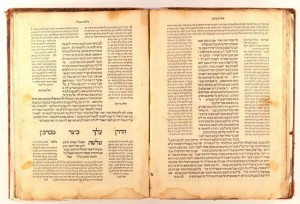 Curious about how Rabbinic hermeneutics works? This is a good resource for an entry into how Jewish hermeneutics works. Click on “Rules of Jewish Hermeneutics” to check out the website. It was put together by HIllel Ben David (Greg Killian). Check it out.
Curious about how Rabbinic hermeneutics works? This is a good resource for an entry into how Jewish hermeneutics works. Click on “Rules of Jewish Hermeneutics” to check out the website. It was put together by HIllel Ben David (Greg Killian). Check it out.
Resurrection? Bringing the Blog back to Life
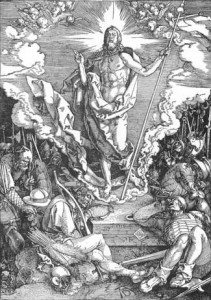 Happy Easter to all! Christos Anesti!
Happy Easter to all! Christos Anesti!
It has been just over two months since our last post here on The Time Has Been Shortened, and after friends have pestered us about whether or not we are going to continue blogging, we feel that it is time for an explanation. Many of us are very busy in life right now as grad students. With some of us having two or more jobs, pastoring, grad work, having children, etc. it has been very difficult to maintain a blog on biblical studies. We have been discussing this and have decided to incorporate more of our current projects and interests from our classes, especially major paper topics that we find interesting or worth sharing.
Also we have had many requests to finish the New Testament portion of our interview series I began entitled: “Monotheism and the Bible: Origins, Issues, and the Status Quaestionis.” The interviews with Nathan McDonald and Michael Heiser in the “Monotheism and the Hebrew Bible” section were well received. They have been found to be helpful for people interested in receiving a basic introduction to the contours of the present scholarly conversation regarding “monotheism” and the Ancient Israelite religion (whether variegated or monolithic) represented in the Hebrew Bible.
What still remains is to complete the interviews regarding the nature of Christology and Monotheism that is represented in the New Testament. The interviewees chosen for this specific topic were chosen based on their experience in the field: Larry Hurtado, who has written and taught for many years on the topic, and James McGrath, whose 2009 monograph “The Only True God: Early Christian Monotheism in its Jewish Context” sparked a lively discussion between the two scholars highlighting important points of divergence in the wider conversation regarding the nature of early Christian monotheism and christology. It will be genuinely interesting to pick up this conversation where it left off to see if there are any further nuances the scholars would like to share regarding this heated topic of discussion. My hope is that both will still graciously participate, even though the interview series had been put on hold for the semester.
“The Time Has Been Shortened” is happy to announce it’s resurrection on resurrection day. What better day to do it?



